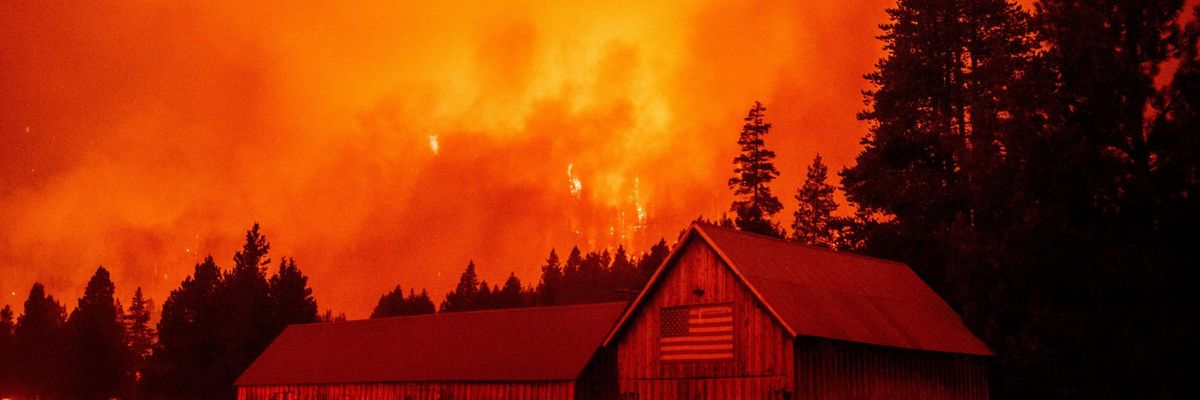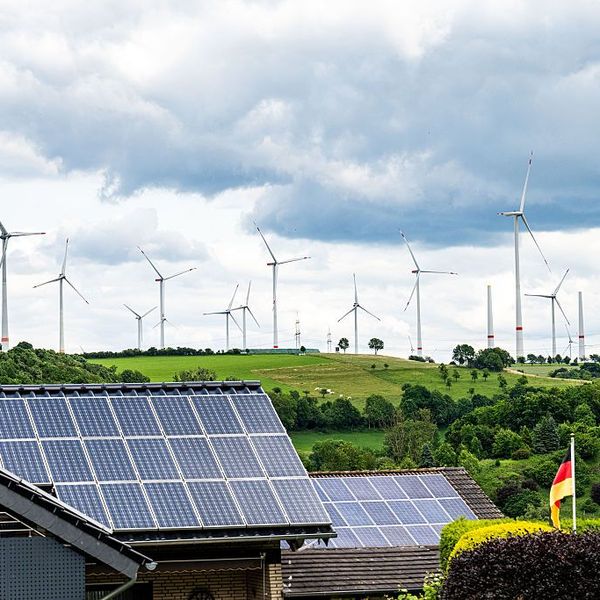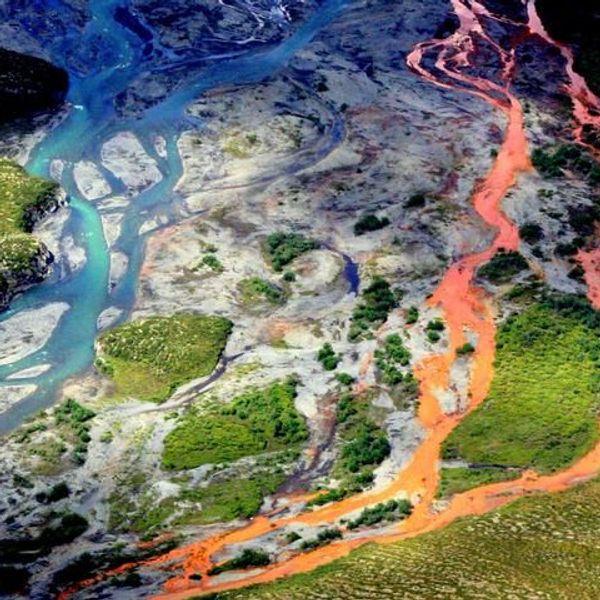
Flames rip across a hillside behind a building as the Caldor Fire pushes into South Lake Tahoe, California on August 30, 2021. (Photo: Josh Edelson/AFP via Getty Images)
NOAA Report Shows 310 Climate-Linked Disasters Cost US Over $2 Trillion Since 1980
"This report underscores the reality of how the climate crisis is already affecting people's lives and the economy."
As new statistics published Monday by the U.S. National Oceanic and Atmospheric Administration revealed the United States has sustained more than $2 trillion in damages wrought by over 300 weather and climate disasters since 1980, a leading economist specializing in equitable climate solutions reiterated the need for urgent action--starting with passing Democrats' flagship Build Back Better Act--to mitigate the planetary emergency.
"Policymakers must take drastic actions to rein in global warming emissions across all sectors of the economy."
According to NOAA, there were 310 U.S. weather and climate disasters since 1980 whose inflation-adjusted costs each exceeded $1 billion, with total damages topping $2.155 trillion. Economic damages from last year's disasters alone exceeded $145 billion, making 2021 the third-costliest in the time period studied. These events claimed 688 human lives and injured scores more.
"The sobering power of NOAA's annual data on billion-dollar disasters highlights a worsening and undeniable trend," Rachel Cleetus, policy director and lead economist for the Climate and Energy Program at the Union of Concerned Scientists (UCS), said in a statement. "This report underscores the reality of how the climate crisis is already affecting people's lives and the economy."
\u201c(2 of 6) The U.S. was hit with 20 #BillionDollarDisasters in 2021 that caused the deaths of at least 688 people and cost more than $145 billion in damage, according to @NOAANCEI #StateOfClimate report: \n\nhttps://t.co/X3FWr7YeDI\u201d— NOAA (@NOAA) 1641831394
"Additionally, the devastating toll and trauma imposed by extreme weather and climate disasters have, and continue to, hit some people harder than others, with communities of color, low-income communities, and communities that have endured multiple disasters often bearing the brunt of its impacts," she continued. "We simply cannot adapt to runaway climate change."
"Fossil fuel companies and their allies shouldn't be allowed to stand in the way of desperately needed climate action."
NOAA says 2021 was the fourth-warmest ever recorded in the U.S. Additionally, Copernicus, the European Union's Earth observation program, reported Monday that the last seven years were the hottest on record worldwide as the atmospheric concentration of greenhouse gases carbon dioxide and methane continue to rise, despite a slight decline early during the Covid-19 pandemic.
Cleetus stressed that "to curtail the worst climate and extreme weather disasters, policymakers must take drastic actions to rein in global warming emissions across all sectors of the economy during this consequential decade and invest in climate resilience."
She referenced as one step President Joe Biden's flagship Build Back Better Act, which has been weakened by right-wing Democrats like Sen. Joe Manchin (D-W.Va.) and remains stalled in the U.S. Senate
The legislation, said Cleetus, could be "a crucial step to shift sharply away from fossil fuels toward clean energy and ensure communities are better prepared for disasters before they strike."
"Fossil fuel companies and their allies shouldn't be allowed to stand in the way of desperately needed climate action," she added.
An Urgent Message From Our Co-Founder
Dear Common Dreams reader, The U.S. is on a fast track to authoritarianism like nothing I've ever seen. Meanwhile, corporate news outlets are utterly capitulating to Trump, twisting their coverage to avoid drawing his ire while lining up to stuff cash in his pockets. That's why I believe that Common Dreams is doing the best and most consequential reporting that we've ever done. Our small but mighty team is a progressive reporting powerhouse, covering the news every day that the corporate media never will. Our mission has always been simple: To inform. To inspire. And to ignite change for the common good. Now here's the key piece that I want all our readers to understand: None of this would be possible without your financial support. That's not just some fundraising cliche. It's the absolute and literal truth. We don't accept corporate advertising and never will. We don't have a paywall because we don't think people should be blocked from critical news based on their ability to pay. Everything we do is funded by the donations of readers like you. Will you donate now to help power the nonprofit, independent reporting of Common Dreams? Thank you for being a vital member of our community. Together, we can keep independent journalism alive when it’s needed most. - Craig Brown, Co-founder |
As new statistics published Monday by the U.S. National Oceanic and Atmospheric Administration revealed the United States has sustained more than $2 trillion in damages wrought by over 300 weather and climate disasters since 1980, a leading economist specializing in equitable climate solutions reiterated the need for urgent action--starting with passing Democrats' flagship Build Back Better Act--to mitigate the planetary emergency.
"Policymakers must take drastic actions to rein in global warming emissions across all sectors of the economy."
According to NOAA, there were 310 U.S. weather and climate disasters since 1980 whose inflation-adjusted costs each exceeded $1 billion, with total damages topping $2.155 trillion. Economic damages from last year's disasters alone exceeded $145 billion, making 2021 the third-costliest in the time period studied. These events claimed 688 human lives and injured scores more.
"The sobering power of NOAA's annual data on billion-dollar disasters highlights a worsening and undeniable trend," Rachel Cleetus, policy director and lead economist for the Climate and Energy Program at the Union of Concerned Scientists (UCS), said in a statement. "This report underscores the reality of how the climate crisis is already affecting people's lives and the economy."
\u201c(2 of 6) The U.S. was hit with 20 #BillionDollarDisasters in 2021 that caused the deaths of at least 688 people and cost more than $145 billion in damage, according to @NOAANCEI #StateOfClimate report: \n\nhttps://t.co/X3FWr7YeDI\u201d— NOAA (@NOAA) 1641831394
"Additionally, the devastating toll and trauma imposed by extreme weather and climate disasters have, and continue to, hit some people harder than others, with communities of color, low-income communities, and communities that have endured multiple disasters often bearing the brunt of its impacts," she continued. "We simply cannot adapt to runaway climate change."
"Fossil fuel companies and their allies shouldn't be allowed to stand in the way of desperately needed climate action."
NOAA says 2021 was the fourth-warmest ever recorded in the U.S. Additionally, Copernicus, the European Union's Earth observation program, reported Monday that the last seven years were the hottest on record worldwide as the atmospheric concentration of greenhouse gases carbon dioxide and methane continue to rise, despite a slight decline early during the Covid-19 pandemic.
Cleetus stressed that "to curtail the worst climate and extreme weather disasters, policymakers must take drastic actions to rein in global warming emissions across all sectors of the economy during this consequential decade and invest in climate resilience."
She referenced as one step President Joe Biden's flagship Build Back Better Act, which has been weakened by right-wing Democrats like Sen. Joe Manchin (D-W.Va.) and remains stalled in the U.S. Senate
The legislation, said Cleetus, could be "a crucial step to shift sharply away from fossil fuels toward clean energy and ensure communities are better prepared for disasters before they strike."
"Fossil fuel companies and their allies shouldn't be allowed to stand in the way of desperately needed climate action," she added.
As new statistics published Monday by the U.S. National Oceanic and Atmospheric Administration revealed the United States has sustained more than $2 trillion in damages wrought by over 300 weather and climate disasters since 1980, a leading economist specializing in equitable climate solutions reiterated the need for urgent action--starting with passing Democrats' flagship Build Back Better Act--to mitigate the planetary emergency.
"Policymakers must take drastic actions to rein in global warming emissions across all sectors of the economy."
According to NOAA, there were 310 U.S. weather and climate disasters since 1980 whose inflation-adjusted costs each exceeded $1 billion, with total damages topping $2.155 trillion. Economic damages from last year's disasters alone exceeded $145 billion, making 2021 the third-costliest in the time period studied. These events claimed 688 human lives and injured scores more.
"The sobering power of NOAA's annual data on billion-dollar disasters highlights a worsening and undeniable trend," Rachel Cleetus, policy director and lead economist for the Climate and Energy Program at the Union of Concerned Scientists (UCS), said in a statement. "This report underscores the reality of how the climate crisis is already affecting people's lives and the economy."
\u201c(2 of 6) The U.S. was hit with 20 #BillionDollarDisasters in 2021 that caused the deaths of at least 688 people and cost more than $145 billion in damage, according to @NOAANCEI #StateOfClimate report: \n\nhttps://t.co/X3FWr7YeDI\u201d— NOAA (@NOAA) 1641831394
"Additionally, the devastating toll and trauma imposed by extreme weather and climate disasters have, and continue to, hit some people harder than others, with communities of color, low-income communities, and communities that have endured multiple disasters often bearing the brunt of its impacts," she continued. "We simply cannot adapt to runaway climate change."
"Fossil fuel companies and their allies shouldn't be allowed to stand in the way of desperately needed climate action."
NOAA says 2021 was the fourth-warmest ever recorded in the U.S. Additionally, Copernicus, the European Union's Earth observation program, reported Monday that the last seven years were the hottest on record worldwide as the atmospheric concentration of greenhouse gases carbon dioxide and methane continue to rise, despite a slight decline early during the Covid-19 pandemic.
Cleetus stressed that "to curtail the worst climate and extreme weather disasters, policymakers must take drastic actions to rein in global warming emissions across all sectors of the economy during this consequential decade and invest in climate resilience."
She referenced as one step President Joe Biden's flagship Build Back Better Act, which has been weakened by right-wing Democrats like Sen. Joe Manchin (D-W.Va.) and remains stalled in the U.S. Senate
The legislation, said Cleetus, could be "a crucial step to shift sharply away from fossil fuels toward clean energy and ensure communities are better prepared for disasters before they strike."
"Fossil fuel companies and their allies shouldn't be allowed to stand in the way of desperately needed climate action," she added.

